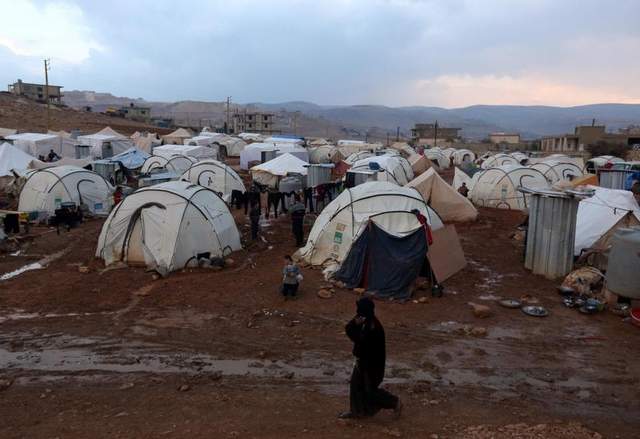
Lebanon is in danger of becoming a casualty of the war raging in neighboring Syria. It is not the fear of renewed civil war that has created this imminent crisis for Lebanon. More threatening is the flood of Syrian refugees that has overwhelmed the country, threatening it with economic collapse and challenging its capacity to survive as a nation.
It is only right that the world has focused on the terrible plight of the Syrian people. But the enormous effect on Lebanon of this continuing human tidal wave must also be considered. There are already more than 821,000 Syrian refugees in Lebanon, according to the Office of the United Nations High Commissioner for Refugees (UNHCR).
The UN agency estimates that if the Syrian war continues apace, by the end of this calendar year, the refugee total will equal a quarter of Lebanon’s normal population of 4 million.
The crisis has affected Lebanon on many levels. Because Lebanon has not built refugee camps, the Syrian exiles have moved into communities across the country. Many have crowded into low-income apartments, resulting in a housing shortage and a spike in rental rates, which have gone up by more than 40% in some areas. This has pushed some poorer Lebanese citizens out of the housing market, forcing them to become “internally displaced persons.”
Meanwhile other Syrians have created informal tent settlements in towns and villages throughout Lebanon, putting serious stress on host communities. The UNHCR estimates that there are 1,400 of these settlements. Because the newcomers flooding the job market are often willing to work for less, official statistics now report that average wages have plummeted, and 20% of Lebanese are now unemployed.
All of this is taking its toll on the national economy. The World Bank projects that Lebanon’s GDP will decline by 2.9% each year from 2012 to 2014. Government revenues will decrease by $1.5 billion annually, while government expenditures are expected to rise by more than $1 billion per year, owing to the increased demand for services. Additionally, 170,000 Lebanese will be forced into poverty this year.
The problems don’t end there. The 90,000 Syrian children registered in local schools have created serious overcrowding, and the same is true in health care, and the public and social service sectors. Water, gas and electricity rates have all increased by 7.4% in the last year. Some medicines are now in short supply.
With winter approaching, the stress on the food![]() supply, housing, health care and other services will only grow. Last winter, there were about 150,000 refugees in Lebanon; this winter, there will be more than seven times that number.
supply, housing, health care and other services will only grow. Last winter, there were about 150,000 refugees in Lebanon; this winter, there will be more than seven times that number.
Naturally, all this is leading to social tensions within Lebanon. Polling data show that many Lebanese have become resentful. The poor see their country being overrun, so that working-class Lebanese people can’t find jobs or must settle for lower wages while facing higher living costs. They resent the fact that the refugees receive international assistance, while they do not.
Ninette Kelley, the UNHRC’s representative in Lebanon, has written that even with these strains, which no country should be expected to bear, “Lebanon stands as an example of generosity in the face of crisis. Despite misunderstandings and tensions, everyday acts of kindness are commonplace.” But, she warns, “without more international support, the patience and hospitality of host communities may wear thin. Continuing neglect will stoke rising tensions and raise the risk that the … Syrian civil war will become a regional war.”
The situation in Lebanon demands immediate attention from the rest of the world. I cannot disagree with the push to rid Syria of chemical weapons, to convene a Geneva II meeting in hopes of finding a way out of the country’s long war, and to provide more assistance to alleviate the humanitarian crisis of the Syrian refugees. But Lebanon can no longer be ignored. The country must be helped to strengthen its capacity to deal![]() with this crisis.
with this crisis.
Specifically, the Lebanese army![]() needs assistance in controlling the border and providing internal security, while the government and the country’s institutions need financial and logistical assistance in supporting Lebanon’s poor, especially those who have been displaced in their own country by the influx of refugees.
needs assistance in controlling the border and providing internal security, while the government and the country’s institutions need financial and logistical assistance in supporting Lebanon’s poor, especially those who have been displaced in their own country by the influx of refugees.
Our concern for what is happening to Syria and Syrians cannot and must not drown out our concern for Lebanon and its people. If we continue to ignore Lebanon, in short order, that country might collapse under the weight of the still-growing pressures to which it has been subjected.
James Zogby is founder and president of the Arab American Institute.



